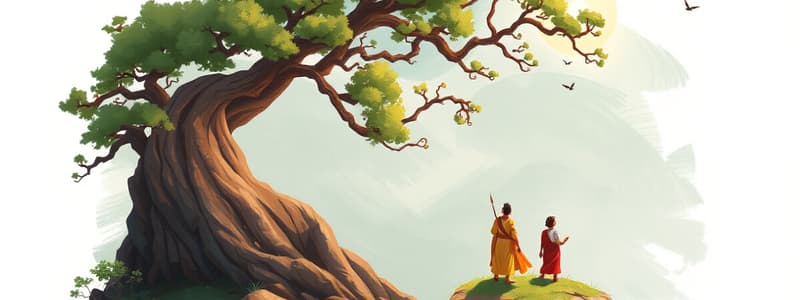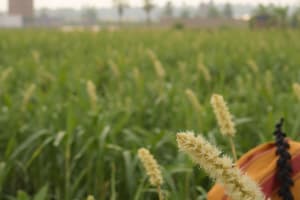Podcast
Questions and Answers
What language family does Tamil belong to?
What language family does Tamil belong to?
- Indo-European
- Sino-Tibetan
- Dravidian (correct)
- Austronesian
Which region is NOT predominantly associated with Tamil speakers?
Which region is NOT predominantly associated with Tamil speakers?
- Tamil Nadu
- Sri Lanka
- Nigeria (correct)
- Singapore
Which dialect of Tamil is spoken mainly in Northern Sri Lanka?
Which dialect of Tamil is spoken mainly in Northern Sri Lanka?
- Nellai Tamil
- Jaffna Tamil (correct)
- Kongu Tamil
- Madurai Tamil
What is the basic sentence structure of Tamil?
What is the basic sentence structure of Tamil?
Which of the following is a major festival celebrated in Tamil culture?
Which of the following is a major festival celebrated in Tamil culture?
Which script is used to write the Tamil language?
Which script is used to write the Tamil language?
How many vowels are there in the Tamil script?
How many vowels are there in the Tamil script?
What status has been granted to the Tamil language by the Government of India?
What status has been granted to the Tamil language by the Government of India?
Flashcards are hidden until you start studying
Study Notes
Overview of Tamil
- Language Family: Dravidian language family.
- Speakers: Over 75 million speakers worldwide.
- Regions: Predominantly spoken in Tamil Nadu (India), Sri Lanka, Singapore, and Malaysia.
Historical Background
- Oldest Language: One of the oldest continuously spoken classical languages in the world.
- Literary Tradition: Rich literary history dating back over 2,000 years, with classical texts like Sangam literature.
Dialects
- Main Dialects:
- Kongu Tamil: Spoken in the western part of Tamil Nadu.
- Madurai Tamil: Predominantly in the southern regions.
- Nellai Tamil: Dialect from Thoothukudi and surrounding areas.
- Jaffna Tamil: Spoken in Northern Sri Lanka.
Script
- Writing System: Tamil script, derived from the Brahmi script.
- Characters: 12 vowels, 18 consonants, and one special character (the vowel-consonant combination).
Grammar
- Sentence Structure: Generally SOV (Subject-Object-Verb).
- Tenses: Present, past, and future tenses with specific markers for each.
Cultural Significance
- Cinema: Integral part of Tamil culture, with a significant film industry (Kollywood).
- Festivals: Celebrates various festivals like Pongal and Thaipusam, reflecting agricultural and religious practices.
Global Influence
- Diaspora: Significant Tamil-speaking populations in various countries, contributing to cultural exchange.
- Education: Tamil is taught in schools and universities around the world, promoting language preservation.
Contemporary Usage
- Media: News, literature, and digital content available in Tamil.
- Technology: Increasing presence in tech with software localization and online platforms.
Recognition
- Classical Language: Declared a classical language by the Government of India for its historical and cultural significance.
Overview of Tamil
- Belongs to the Dravidian language family.
- More than 75 million speakers globally.
- Majorly spoken in Tamil Nadu (India), Sri Lanka, Malaysia, and Singapore.
Historical Background
- Recognized as one of the world’s oldest continuously spoken classical languages.
- Boasts a literary legacy exceeding 2,000 years, highlighted by classical texts such as Sangam literature.
Dialects
- Kongu Tamil: Common in the western regions of Tamil Nadu.
- Madurai Tamil: Predominantly used in southern Tamil Nadu.
- Nellai Tamil: Associated with the Thoothukudi area.
- Jaffna Tamil: Found in Northern Sri Lanka.
Script
- Written using Tamil script which is derived from Brahmi.
- Comprises 12 vowels, 18 consonants, plus a special character for vowel-consonant combinations.
Grammar
- Follows a Subject-Object-Verb (SOV) sentence structure.
- Utilizes present, past, and future tenses, each with distinct markers.
Cultural Significance
- Cinema plays a vital role in Tamil culture, with a thriving film industry known as Kollywood.
- Festivals such as Pongal and Thaipusam celebrate agricultural heritage and religious beliefs.
Global Influence
- Significant Tamil-speaking communities abroad facilitate cultural exchanges.
- Tamil education is supported in schools and universities worldwide for language preservation.
Contemporary Usage
- Tamil media includes news, literature, and an extensive online presence.
- Technology integration involves software localization and online applications in Tamil.
Recognition
- Designated as a classical language by the Government of India due to its historical and cultural importance.
Studying That Suits You
Use AI to generate personalized quizzes and flashcards to suit your learning preferences.



